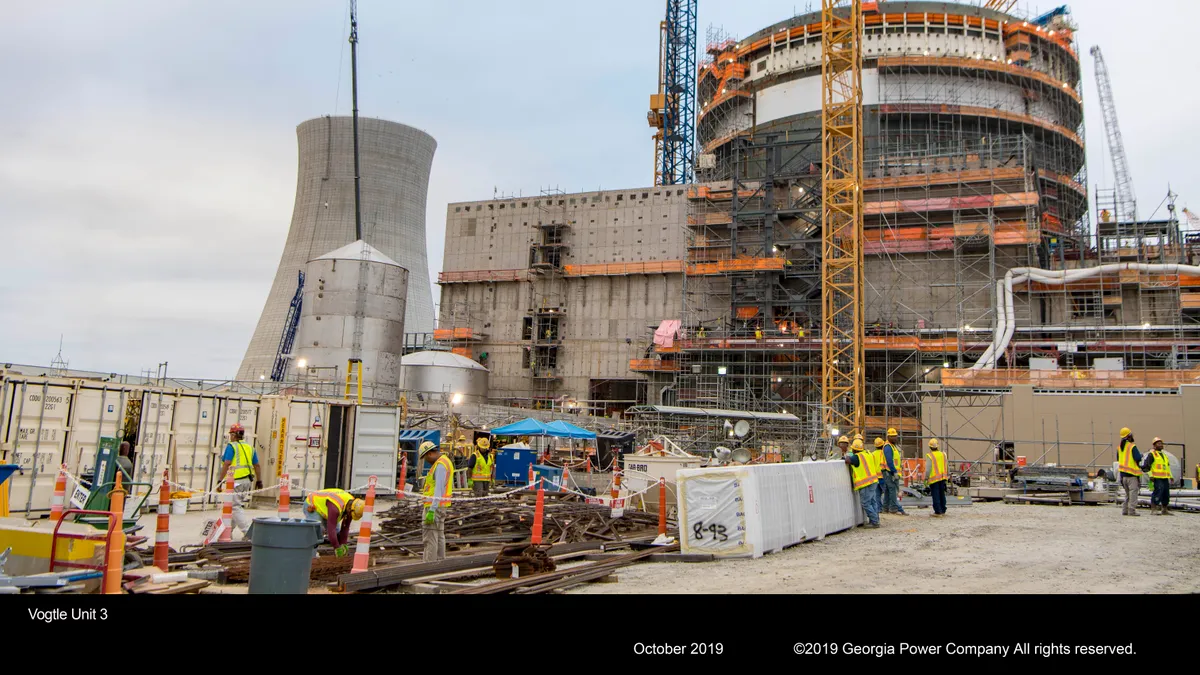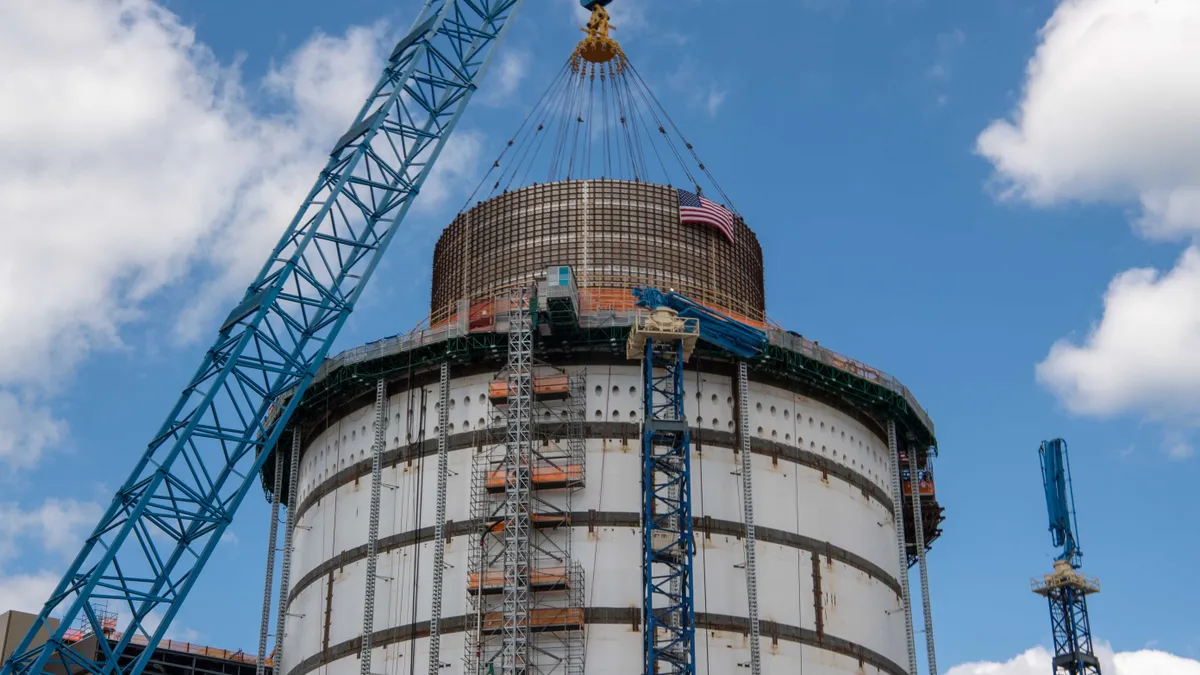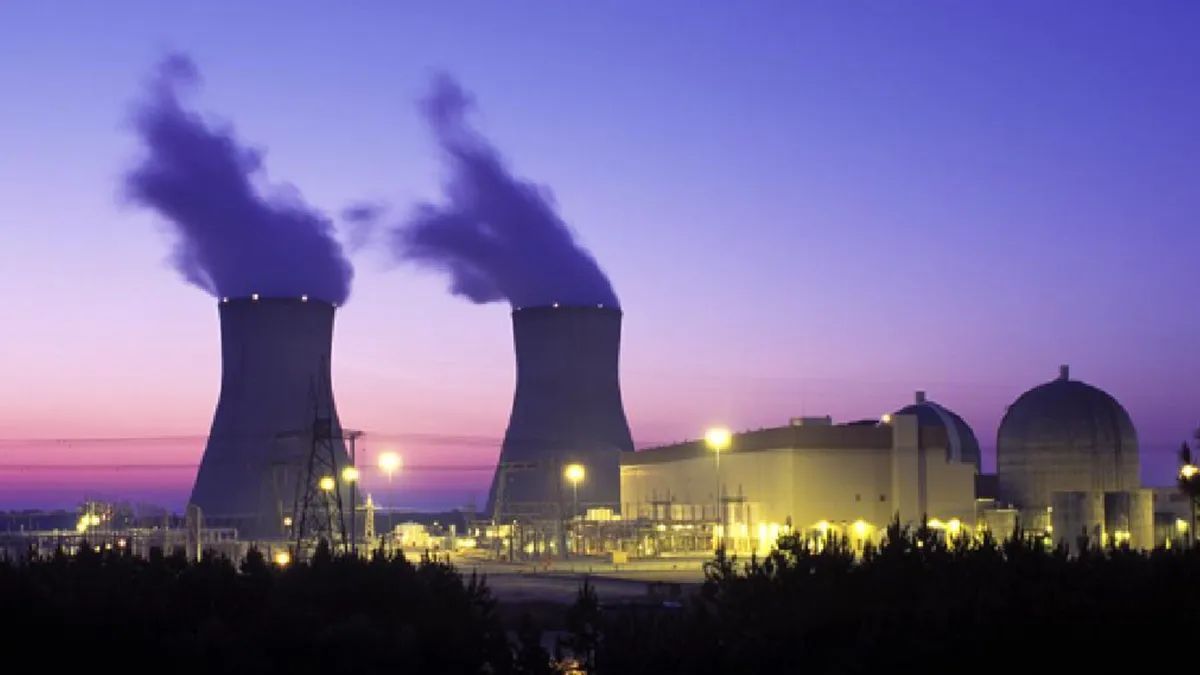UPDATE: August 30, 2021: The Nuclear Regulatory Commission on Friday released its initial conclusions from the June 21 special inspection of the Vogtle nuclear power plant units under construction. The inspection identified issues with the safety-related electrical raceway system at Unit 3. "The conditions ... if left uncorrected, would prevent the plant from operating within the NRC’s regulations. However, there is no increased risk to the public while Southern Nuclear corrects the conditions because there is no nuclear fuel in the reactor," NRC said in a statement. "If finalized at their current level, the findings will increase NRC oversight at the plant," NRC added. Vogtle operator Southern Nuclear Operation Co. can accept the findings or provide additional information, NRC said.
Dive Brief:
- Independent monitors told a Georgia regulatory body that a special inspection by the Nuclear Regulatory Commission (NRC) into construction at Georgia Power's Vogtle-3 nuclear reactor could represent a "very significant" issue for the troubled project.
- NRC announced last week a probe focused on the unit's electrical cable raceway system, which supports the cables that power safety-related equipment. NRC said it will not authorize Georgia Power to load fuel until remediation and construction is complete and the plant's partners satisfy the standards in their combined license.
- Georgia Power identified cable raceway issues in late 2020 and deemed them significant in January 2021, the company said in an April filing. However, experts for the Georgia Public Service Commission (PSC) said at a hearing last week that the NRC inspection could look at broader quality and construction issues at the plant and NRC said in a press release the investigation will include a review of the company's root cause investigation, corrective actions and the construction quality assurance process.
Dive Insight:
Vogtle, the only nuclear plant under construction in the U.S., was originally scheduled to have one unit operational in 2016 and another online the following year. It has been slowed by a series of construction and technology problems.
In its latest update to state regulators, Georgia Power said the plant could be operational in the first quarter of 2022, but the PSC's independent monitors said the first reactor likely wouldn't be in operation until at least the summer. The monitors also projected another $2 billion increase in costs for a project that has already blown past its original $14 billion price tag. Projected costs for the two reactors had previously been estimated at more than $25 billion.
The newly announced inspection should not affect hot functional testing, the crucial test that simulates thermal working conditions on a new reactor before fuel is loaded. However, Don Grace, a member of PSC's Vogtle Monitoring Group, said at Thursday's hearing that the "increased level of oversight" from NRC could create even more delays. Grace raised concerns about the "quality of construction." Bill Jacobs, an engineer monitoring the project for PSC, said the inspection could be a "major deal" if it expands beyond the cable concerns.
Kurt Ebersbach, a senior attorney with the Southern Environmental Law Center, said ratepayers could have reason for alarm after years of delays and cost overruns.
"Everyone agrees we want a safe plant in the end, but the immediate question is the management style and what is causing these quality issues," said Ebersbach. "If you're a Georgia Power ratepayer, this is frustrating."
In a statement, Georgia Power spokesperson Jeff Wilson said the company "welcomes NRC's inspection of its construction activities and will be engaged in NRC's inspection process."
"Our initial communications with NRC staff indicate that the special inspection will focus on the construction remediation work, primarily related to electrical commodity installations, we previously disclosed and the improvement plans we are undertaking to correct both installation and any quality control issues," Wilson said.
Georgia Power had identified flaws in how the cables were installed, with some being pulled too tightly to fit properly into cable trays and others being terminated incorrectly. That could potentially lead to a loss of control of safety systems or a more dangerous accident. A 1975 fire at Tennessee Valley Authority's Browns Ferry Nuclear Plant in Alabama was traced back to cable installation, according to an NRC report.
"Now is the time to take care of these things," said Steve Biegalski, chair of the nuclear and radiological engineering and medical physics program at Georgia Institute of Technology. "This should show the general public that their regulator is not glossing over things and will go through this plant with a fine-tooth comb. It should instill some confidence in the plant and process of building it."
Ebersbach, however, said the repeated issues at Vogtle represent the difficulty in constructing new nuclear facilities. Even as the Biden administration says it supports nuclear energy as a climate change strategy, the industry's slow progress has lowered its profile. Vogtle was meant to show off first-of-its-kind technology, but that has generated a series of delays with licensing and construction.
"Georgia Power likes to bring up that this is the only nuclear project under construction in the U.S. and you can expect some first-time problems," said Ebersbach. "Whenever I hear that, I think this is going to be the last project under construction because it's been a poster child for how bad it can get."















